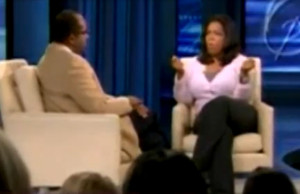 I have always considered the Oprah show to be a cut above the other fare of daytime talk shows, one that didn’t stoop to the oh-so-delicious lows those other shows did. I respected it for that reason. I was disappointed when Mackenzie Phillips went on to talk about her molestation – or whatever you would call what happened to her – at the hands of her father, since its salaciousness was beneath the integrity of the show and the reputation that Oprah has tried to develop for herself. When I saw a commercial for the appearance of Jim Jones, Jr. on Oprah, I hoped for something of her usual standards. Sadly, I was more than a little disappointed.
I have always considered the Oprah show to be a cut above the other fare of daytime talk shows, one that didn’t stoop to the oh-so-delicious lows those other shows did. I respected it for that reason. I was disappointed when Mackenzie Phillips went on to talk about her molestation – or whatever you would call what happened to her – at the hands of her father, since its salaciousness was beneath the integrity of the show and the reputation that Oprah has tried to develop for herself. When I saw a commercial for the appearance of Jim Jones, Jr. on Oprah, I hoped for something of her usual standards. Sadly, I was more than a little disappointed.
Let’s start with the important things that weren’t mentioned. Jim’s brother Stephan Jones was mentioned as the “homemade” member of the “Rainbow Family,” but was not identified by name, much less that he had stood up to his father numerous times in Jonestown and believes he might have been able to stop the deaths on November 18, had he been there instead of with the basketball team in Georgetown. Even worse, no one talked about Marceline’s doubts and her resistance to her husband, even if her efforts were futile on the last day. I have always found Stephan and Marceline in particular to be forces of resistance. Witness Stephan’s comment in the MSNBC Witness to Jonestown documentary from 2008 about his father’s drug use: “You? don’t tell God he has a drug problem!” I don’t recall Jim Jones Jr. expressing such dissent in 1978.
I understand that the time limitations of the program – Jim Jones Jr. sharing the hour with the sister of another mass murderer; use of clips from a 13-year-old A&E documentary and the more recent PBS documentary, Jonestown: The Life and Death of Peoples Temple; plus commercials – meant Oprah wouldn’t be able to probe too deeply, yet it felt like the “made for TV” version of the actual story. I was nevertheless appalled that the producers would have the gall to show photos of the dead bodies in Jonestown – only warning that the video was “not for children” – yet shy from what Jim Jones himself said Peoples Temple was about. When I heard Jim’s answer – “The ‘non-isms’: non- racism…” – I realized the program was going to totally sanitize and gloss over the realities of Jonestown, that he was simply (if dramatically) stating his rejection of his father’s philosophies.
I also felt that Oprah hadn’t done her homework and – as a result – misrepresented the dead. To her, they were brainwashed mindless automatons, unwilling or unable to do anything but give lethal fruit punch to their children and themselves, and/or allow their brothers and sisters to be murdered before their very eyes. We didn’t hear about Christine Miller’s objection or about the drugging of Shanda James or Marceline’s attempts to soften some repercussions against Shanda and other dissenters. These incidents alone have bolstered my own belief that these were not stupid, brainwashed robots, but rather caring people searching for their place, seeking love and acceptance, and truly being misled to believe they were going to affect some change and thinking that, by dying, they were making a statement against the injustices of a by and large evil world. Neither did the program even touch “Revolutionary Suicide” as a concept nor as a specific reason for the deaths.
Thirty-two years ago, the country witnessed the horror – yes, we saw enough of the bodies then – the titillation of drugs and sex within the “cult,” and the consequent disregard for the humanity of the dead that accompanied the return (or non-return) of their remains to their families. We’ve learned a lot more since then, but you wouldn’t have known it from the Oprah interview. She should have known better.
(Ed. Note: Jim Jones’ two brothers, Stephan and Tim, were invited to appear on the same show as Jim, but both declined the offer.)
(Amanda Veazey’s other article in this edition of the jonestown report is What do you hear in these sounds? She may be reached at ahveazey@yahoo.com.)